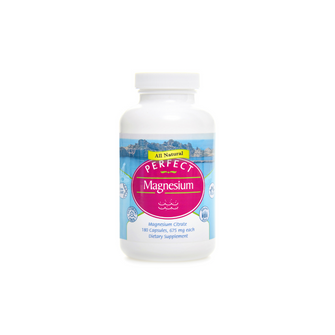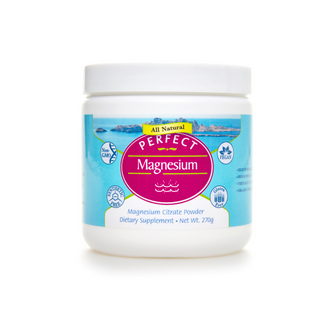Categories
Ok, so as you may be aware, Perfect Supplements have just launched a magnesium powder and that is magnesium citrate; an all-natural form of magnesium that is 100% free from synthetics (unlike many/most other forms of magnesium powder for supplementation).
I'm writing this article to set things straight and shed some light on the misinformation that citrate is not a good form or even risky for one's health. It poses no health risk and on the contrary, many potential health benefits!
Perfect Supplements would not stand behind a product which posed any potential risks to a person's health, they are all about finding and creating the most natural, pure supplements and completely free from synthetics, that is the truth.
So back to the untrue and confusing claims...
These claims are made that magnesium citrate lowers ceruloplasmin levels (ceruloplasmin, a glycoprotein produced in the liver, carries or transports more than 95 per cent of the copper in blood plasma) but there is no evidence of this. I mean, sure there may be studies pointing to citrate lowering ceruloplasmin levels but 2 things can be debated here and that is:
- Is this even a negative thing for health?
- The dosage of magnesium citrate
Those studies related to these claims, use a LARGE amount of citrate so that would be like sitting down and consuming a whole tub of Perfect Magesnium and nobody would do ever do that! And so because nobody will ever be ingesting such large quantities of magnesium citrate in one serving, how relevant is this debate really?
Perfect Supplements provide feedback from 2 well-respected Dr's on the ceruloplasmin levels question, see below...
From Dr Erica Le Pore, ND:
"I can't find any research to indicate that lowering ceruloplasmin levels is harmful in any way. I think the research is clear that ascorbate and citrate do lower ceruloplasmin levels, however, it doesn’t seem to be clinically significant. I’ve read people’s opinions and some of the PubMed articles, but I can’t find any definitive research that lowering ceruloplasmin results in any harm (and some studies show benefit). There seems to be a lot of back up mechanisms to ensure homeostasis for copper and iron. I don’t think the dose of citrate in a magnesium supplement would have any effect at all. I’m thinking it would have to be IV magnesium to have any real negative effect, and I’m not even sure about that."
Magnesium Citrate and Ceruloplasmin Clarification by Doctor Carolyn Dean
Dr Dean says from an article she wrote back in 2016 about this:
"As Morley Robbins said in a post to the Magnesium Advocacy Group Dec 14, 2016, he and I don’t agree that magnesium citrate should be avoided. Morley gives the link to a recent paper that I sent him by the highly credentialed magnesium expert, Dr Andrea Rosanoff, from the Center for Magnesium Education and Research. The paper is called Magnesium Citrate and Ceruloplasmin Consumer Education and Overview
Besides the fact that Dr Rosanoff says there is no evidence for concern about magnesium citrate and ceruloplasmin, my position is that I don’t see any upside to scaring people about a magnesium compound that has been used for decades with no side effects"
To read more of her article you can find it here.
No Clinical evidence that Mg citrate is harmful
For Some Further Research/Articles Please See Below
Is elevated serum ceruloplasmin level associated with increased risk of coronary artery disease?
The following is taken from the Canadian Journal of Cardiology:
"An imbalance between the lipid peroxidation process and antioxidative protection is associated with the pathophysiology of coronary artery disease (CAD). The authors aimed to determine the relationship between the contributors of antioxidant protection, such as paraoxonase-1 (PON1) activity, albumin, vitamin C and ceruloplasmin (CP) levels, and lipid peroxidation indicators."
Read more about this here.
Ceruloplasmin Acting as an Oxidant
Intact human ceruloplasmin oxidatively modifies low-density lipoprotein.
And here ceruloplasmin acts as an oxidant (it can have pro-oxidant or oxidant activity): Ehrenwald E, Chisolm GM, Fox PL. Intact human ceruloplasmin oxidatively modifies low-density lipoprotein. J Clin Invest. 1994;93:1493–501
You can read about this here.
Why Not Magnesium Glycinate or Bisglycinate?
Magnesium Glycinate and Bisglycinate products are very popular. The largest supplier of Bisglycinate is Albion – under the TRAACS trademark. We contacted Albion and confirmed that the Glycinate and Bisglycinate are synthetic.
As there is no all-natural Magnesium Glycinate or Bisglycinate on the market, and we do NOT make products with synthetics, Perfect Supplements had to eliminate this form of Magnesium.
A little further down we will have a discussion on if the synthetic forms of magnesium have advantages in terms of bioavailability and absorption.
Why Don’t We Use Magnesium L-Threonate (MagTein)?
Magnesium L-Threonate, sold under the brand name – MagTein from AIDP is very popular due to its claims to pass the blood-brain barrier.
Perfect Supplements contacted AIDP and discovered that Magnesium L-Threonate is made with synthetics. Thus, they had to eliminate MagTein as well.
Magnesium Glycinate vs Magnesium Citrate
Looking at Magnesium Glycinate vs Magnesium Citrate, both have high bioavailability and absorption rates. It is true that Magnesium Citrate pulls more water into the intestines and thus can have a laxative effect at a higher dosage.
Magnesium Glycinate pulls in less water, so you tend to have less of a laxative effect.
If you are looking to minimize the laxative effect and don’t have a problem taking synthetics, then the Magnesium Glycinate can make sense. One thing to be aware of, it is triple the price of Perfect Magnesium, on a gram per gram basis of magnesium.
So, if you are looking to avoid synthetics and can manage (or desire) the laxative effect of our Perfect Magnesium, you will save a great deal of money!
The MagTein or Magnesium L-Threonate is very interesting because it makes the claim as the only magnesium that crosses the blood-brain barrier. Therefore, many people take this for mood enhancement and don’t believe a Magnesium Citrate could accomplish this goal.
From reading MagTein’s own published study, it seems clear that Magnesium Citrate does cross the blood-brain barrier, just at a slightly lower rate than MagTein.
While they make the case that only Magnesium L-Threonate (MgT) significantly raised magnesium levels in the brain, their own results show something very interesting...
The above shows a test they did with rats, testing brain function by recognition. It is true that MgT – MagTein scored the highest...but looking at MgCitrate you see it was only slightly behind MgT.
These results would indicate that Magnesium in other forms does have an effect on the brain, it is just that MgT had the greatest effect.
It seems reasonable to think, if you can deal with the laxative effect of Magnesium Citrate, you can just take a little more Magnesium Citrate to get a beneficial impact on brain health, while saving money and avoiding synthetics.
I do want to be fair – if your primary concern is brain health and you are okay with synthetics and price is not an issue – the MagTein is the leader.
In Summary on Magnesium Glycinate and L-Threonate...
We totally understand why you may want to use and promote Magnesium Glycinate and Magnesium L-Threonate products. We can not consider them because they are synthetic, but I do think they work well and there are specific cases (for example when laxative effect needs to be avoided) when they are the best options.
I do believe there is a great deal of hype surrounding their ability to outperform Magnesium Citrate, especially when you take price into consideration. In most use cases, a person can take Magnesium Citrate and see great benefits to all parts of their body, at a very affordable price...without the need for synthetics.
What Does the Perfect Magnesium Taste Like?
Like a rainbow J Seriously, it has very little taste. You can easily mix it in water, it dissolves quickly and is virtually tasteless. If you want to try it out, just let me know and I can send you a sample.
What If I Want to Get My Magnesium From Food Sources?
Awesome! We always encourage people to get their nutrients from foods. We just make supplements to help out when you might not be getting enough of a nutrient in your diet.
Perfect Supplements are actually working on a new Organic Plant Protein Powder that will be rich in magnesium. So, if you prefer to get your magnesium from things like Pumpkin Seed – I can definitely let you know when this product is out.
References:
https://www.ncbi.nlm.nih.gov/pmc/articles/PMC2649635/
http://magnesiumeducation.com/consumer-education-research-on-magnesium-issues
https://drcarolyndean.com/2016/12/mag-cit-ceruloplasmin-clarification/
https://www.cell.com/neuron/fulltext/S0896-6273(09)01044-7
https://www.ncbi.nlm.nih.gov/pubmed/8163654








